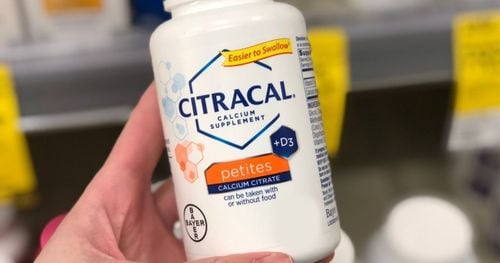This is an automatically translated article.
Vitamin D is one of the most important nutrients for good health. It is found in many foods or synthesized on its own through sunlight. Vitamin D not only helps strengthen the teeth and bones, but it also has the ability to fight cancer very effectively.1. What is Vitamin D?
Vitamin D is a group of fat-soluble prohormones that help the body use phosphorus and calcium to build strong bones and teeth. Exposing your skin to the sun can produce vitamin D, and you can also get this vitamin from a number of other foods. When the body is deficient in vitamin D, it will make bones vulnerable, leading to rickets in children and osteoporosis in adults.For the human body, the two most important types of vitamin D are needed, including vitamin D2 (ergocalciferol) and vitamin D3 (cholecalciferol). In particular, vitamin D2 is abundant in plants, and vitamin D3 is made naturally by the body when your skin is exposed to ultraviolet (UV) rays from sunlight.
Both types of vitamin D above are converted to 25-hydroxyvitamin D in the liver, then they will pass through the blood to reach the kidneys. Here, 25-hydroxyvitamin D enters its second metabolism into 1,25-dihydroxyvitamin D (also known as calcitriol), the active form of vitamin D in the body. To be able to most accurately assess a person's vitamin D status, we usually use a method of measuring 25-hydroxyvitamin D levels in the blood.
Through exposure to the sun, our body can get certain types of vitamin D. In addition, you can also get more vitamin D through food sources, including cod liver oil, fatty fish, eggs, milk, breakfast cereals, juices or supplements.
Trắc nghiệm: Thử hiểu biết của bạn về bệnh ung thư
Ung thư là nguyên nhân gây tử vong hàng thứ 2 trên thế giới. Thử sức cùng bài trắc nghiệm sau đây sẽ giúp bạn có thêm kiến thức về yếu tố nguy cơ cũng như cách phòng ngừa bệnh ung thư.
Bài dịch từ: webmd.com
2. What is the recommended daily amount of vitamin D?
Here are the recommendations of the Institute of Medicine (IOM) about the daily vitamin D consumption requirements for each group of subjects, including:People aged 1 - 70 years: this group of people includes: including pregnant and lactating women. The recommended amount of vitamin D for them is 15 micrograms (μg) per day. Since 1 μg is equivalent to 40 International Units (IU), vitamin D requirements can also be expressed as 600 IU per day. For people 71 years and older: the recommended amount of vitamin D is 20 μg, equivalent to 800 IU per day. For infants: about 10 μg, equivalent to 400 IU per day, should be consumed. With this level, infants will be provided with the full amount of vitamin D needed in a day. Although vitamin D supplementation is a necessity, you should not consume too much vitamin D or any other brain nutrient, as this can cause toxic side effects in the body. . An excess of vitamin D can cause calcium levels to rise, leading to calcium deposition in soft tissues, such as the heart, kidneys, or lungs.
According to researchers, the safe level of vitamin D supplementation for children over 8 years of age and adults is 100 μg, which corresponds to 4000 IU per day. Most of the effects of excess vitamin D stem from overconsumption of supplements rather than from consuming food sources of natural vitamin D.
Also, we should not try to stimulate vitamin D production by overexposure to ultraviolet rays from the sun, as this can increase the risk of skin cancer.

3. What symptoms does vitamin D deficiency cause?
A deficiency of vitamin D can lead to the following typical symptoms:Bone and back pain Wounds that take a long time to heal Frequently being sick Depressed mood Muscle pain Hair loss When vitamin D deficiency lasts for a long time can cause you to have the following serious conditions:
Depression Hypertension Diabetes Obesity Neurodegenerative diseases such as Alzheimer's Disease Development of certain cancers, especially colon cancer, cancer prostate and breast cancer
4. The link between vitamin D and cancer risk
Vitamin D is commonly found in foods such as milk, fatty fish and cereals. In addition, you can also increase the amount of vitamin D you absorb when exposed to sunlight.Several laboratory studies have found that vitamin D has anti-cancer properties, helping to regulate the replication of cancer-related genes and limit the spread of cancer cells. in the body.
The researchers also collected about 160 blood samples from people with cancer (both men and women), and then measured their vitamin D levels. Study participants mainly suffered from the most common cancers such as prostate cancer, breast cancer, thyroid cancer, colorectal cancer and lung cancer.
Among the study participants, about 42% of cancer patients had vitamin D deficiency in their bodies, their vitamin D levels ranging from 20 to 30 nanograms per milliliter (ng/mL) of blood. In addition, about 32% of people have vitamin D deficiency with levels below 20 ng/mL of blood.
Normally, the average level of vitamin D in the blood is about 24 ng/mL. As a result, people with vitamin D levels lower than 24 ng/mL will have an almost 3-fold increased risk of stage III cancer compared with those with high blood levels of vitamin D. Stage III cancers often show more active disease than in earlier stages, including increased tumor size, or the cancer has spread to nearby areas.

5. Some Food Sources of Vitamin D
Usually, the amount of vitamin D will be calculated through the following two units: international units (IU) and micrograms (mcg). Here are some foods rich in vitamin D that you can choose to add to your daily diet:Cooked salmon: in about 85g of cooked salmon will provide about 447 IU / 11 mcg, equivalent to 75% of the RDI (Recommended Intake). Cod liver oil: in 15 ml of cod liver oil will provide about 1,360 IU / 34 mcg, equivalent to 227% of the RDI Cooked beef liver: in 85g of cooked beef liver will provide about 42 IU / 1 mcg, corresponding to 7% RDI One large egg: provides the mineral 41 IU / 1 mcg, equivalent to 7% of the RDI Canned sardines: provides about 23 IU / 0.6 mcg, equivalent to 4% of the RDI In addition, you also You can add some other vitamin D-rich food sources to your daily menu, such as milk, yogurt, salmon, swordfish, Swiss cheese or fortified cereal. If you want to increase your vitamin D through sun exposure, you can do sunbathing at certain times, preferably between 6am and 9am, or after 5pm. Your sunbathing time should not exceed 30 minutes. In addition, when sunbathing, you should wear a hat and sunglasses so that the sun does not shine directly on your eyes or head.
Fatty fish, such as salmon, sardines, swordfish and tuna are all excellent sources of vitamin D, and you should include them in your diet every day to ensure Make sure the body absorbs the required amount. Besides, cod liver oil is said to be the most perfect source of vitamin D, for example, one tablespoon of cod liver oil (15ml) provides twice the daily vitamin D required by the body.
In the event that foods or sunlight do not help the body get the necessary amount of vitamin D, you can take a multivitamin to get the most complete complement of important vitamins and minerals for your body. body.

6. What side effects can an excess of vitamin D cause?
Overconsumption of vitamin D (over 10,000 IU) per day can lead to unwanted side effects on health, researchers say.Excess vitamin D in the body will lead to bone calcification and hardening of blood vessels, heart, lungs and kidneys. When the body has too much vitamin D, it will cause the following symptoms:
Nausea Vomiting Headache Loss of appetite Dry mouth Diarrhea Constipation Ideally, you should supplement vitamin D according to the safe dosage recommended by health care professionals, that is not to exceed 4000 IU per day.
Please dial HOTLINE for more information or register for an appointment HERE. Download MyVinmec app to make appointments faster and to manage your bookings easily.
The article references the source: cancer.gov, webmd.com












